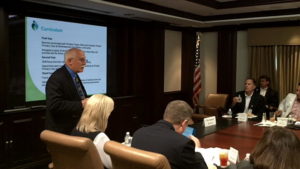
From L-R: Angie Barber, Director, Phoebe Network of Trust School Health Program; Sherri Davis, LPN, Phoebe School Nurse & Asthma Educator; Tina Halverson, Director, Phoebe Physician Group Physician Operations/Quality/Clinical Services; Elena Roman, Executive Director, Phoebe Oncology; Jessica Davis, Senior Manager for Hospital Systems, American Cancer Society; Lori Nurmi, RN, Clinical Director, Phoebe Cancer Center.
(Photo courtesy of Phoebe Putney Health System)
Press Release courtesy of Phoebe Putney Health System
Albany, Ga. – The American Cancer Society presented Phoebe with the 2019 HPV Award which includes a $2,500 grant to help educate families and physicians about the need to vaccinate children against human papillomavirus (HPV).
“The American Cancer Society is determined to protect the future of every boy and girl by preventing six types of cancer with the HPV vaccine. The American Cancer Society recommends that the 2-shot HPV vaccine series is best given to boys and girls at ages 11 or 12. HPV vaccination prevents an estimated 90% of HPV cancers when given at the recommended age, but cancer protection decreases as age at vaccination increases. It is important that you talk to your family doctor and your child’s pediatrician about on-time vaccination,” said Jessica Davis, American Cancer Society Senior Manager for Hospital Systems.
HPV vaccination is covered by most insurance plans, and there is often no cost to get vaccinated. Phoebe is already tracking HPV vaccinations at its clinics and is working to increase vaccination rates. Phoebe’s Network of Trust will educate students about the need to be vaccinated before becoming sexually active, and the grant will help provide Continuing Medical Education about HPV prevention for area physicians.
“The Phoebe Cancer Center truly provides world-class care. We have great success at treating many types of cancer, but we consider it an equally great success when we can help southwest Georgians prevent cancer,” said Elena Roman, Phoebe Executive Director of Oncology. “We are pleased to partner with the American Cancer Society on multiple prevention efforts, and we look forward to the outstanding results we are confident will come from this HPV Award.”
In 2018, Phoebe received a Colorectal Cancer Partnership Award from the American Cancer Society in recognition of Phoebe’s colorectal cancer screening efforts.
###
Follow the Southwest Georgia Network on Twitter @swganetwork.




